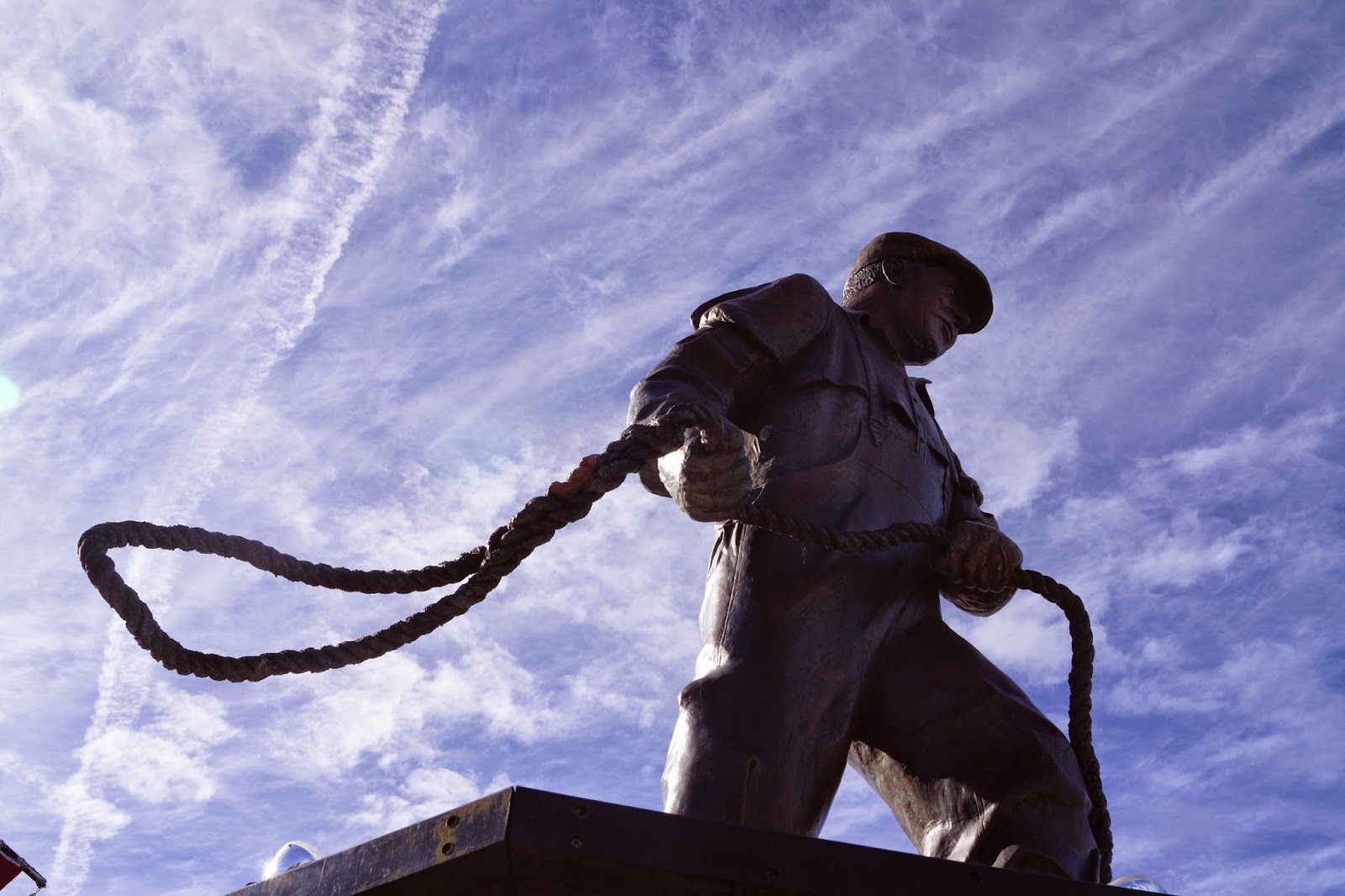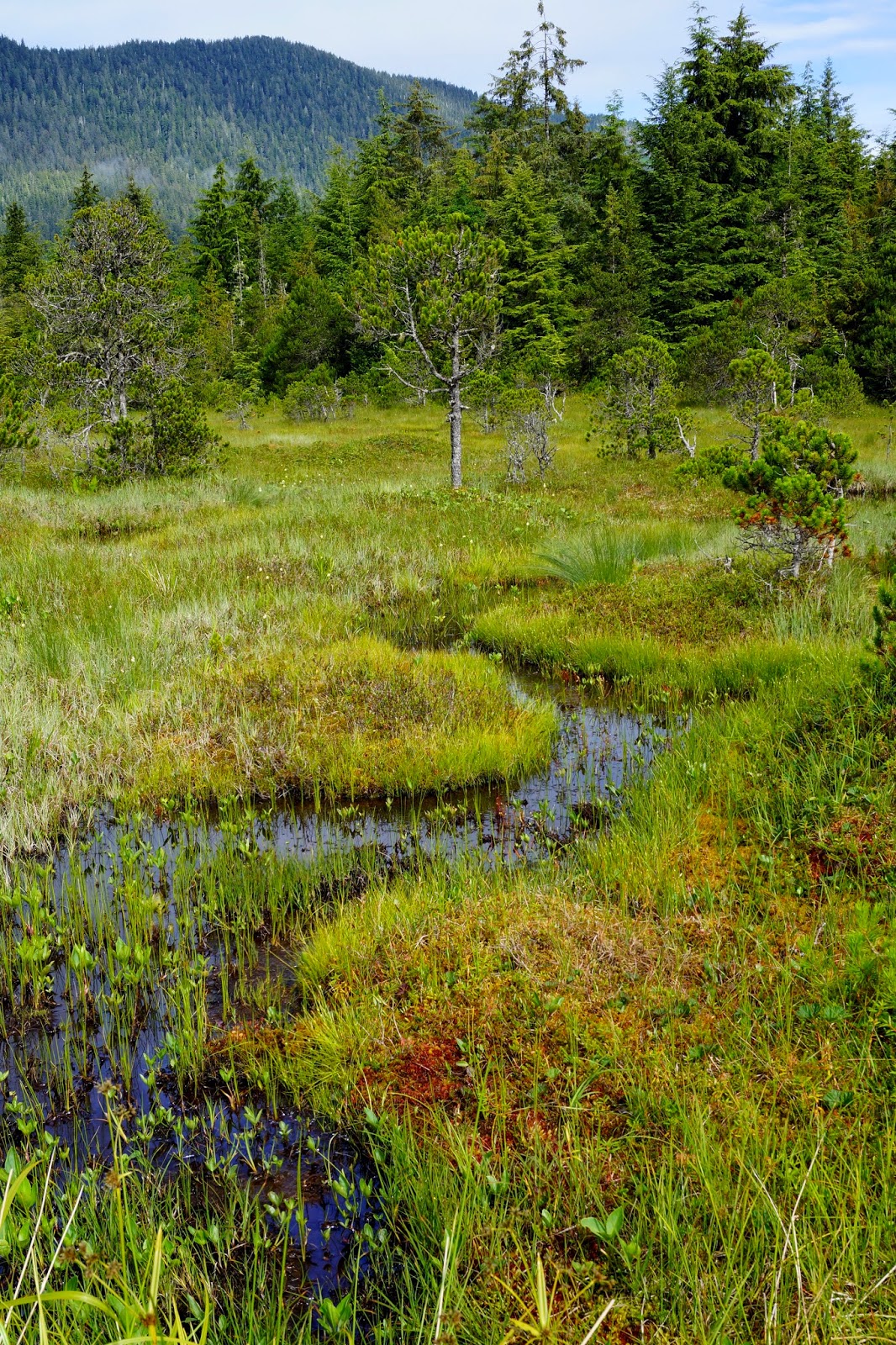During the night our ship traveled south through Frederick Sound to Petersburg, a small fishing village on Kupreanof Island. The last three places we stopped were actually on the mainland, which is why we were seeing so many glaciers. They form in the high mountains of Alaska and Canada and some work their way to the fjords leading to the Inside Passage. Frederick Sound is where we saw all the whales, and we were going to pass through it again. We were all keeping our fingers crossed for whales in the evening.
As we pulled into the dock, the fog slowly lifted to reveal fishing boats coming and going. Petersburg is a very busy port.
During breakfast the sun broke through and the vibrant colors of sky, water and fishing boats emerged.
It's so blue in Alaska!
The green building in the next photo is a fish processing plant. Most of the fishing boats bring their catch to these buildings where they clean, filet, freeze and ship out the fish. We were seeing these in almost every town or city we passed. By the way, since leaving Juneau, for three days we had hardly seen a building, a fence, a power line or any evidence of human beings. Surprisingly, we actually saw very few boats or ships as well.
Now we were back in civilization, though not in a real big way.
This being a fishing town, it is fitting to have a memorial to fisherman lost at sea. It was right outside of the Sons of Norway Hall, where we were invited to a performance of Norwegian folk dance by a group of local children.
We received an informative introduction by a local woman, describing the Norwegian history and culture of the town, as well as a generous and delicious spread of Norwegian cookies made by the young dancers before the dance.
It was wonderful to see young people willing and eager to learn their cultural dances and traditions, and to share them with enthusiasm (especially the cookies). Evidence of this kind of cultural pride was a consistent them of our cruise experience.
We had a few hours to tour the town on a school bus driven by another very knowledgeable local woman who is not only a bus driver, but a historian. She informed us that Petersburg is not named after the Russian city, or the Russian czar, as one might assume, but is named after the man who established the fishing industry, and therefore the town, in this location.
Evidence of the town's fishing history and current industry is everywhere. These are fishing net floats hanging on the side of a building.
These are fish traps sold at the hardware store, along with anything you could ever want for fishing.
This is one of the historic buildings in the town that has Norwegian painting on the shutters. It was, and I believe still is a dormitory for company fishermen.
This was the 5th of July and the town was still in celebration mode. There were sidewalk sales, bunting everywhere and contests, like the herring toss. Yes, the herring toss. Another contest, in which a couple of our fellow passengers actually competed, is the mother-son rowboat race. The mother is blindfolded and has the oars, and the son has to direct her as to how to row. (Ingenious.) Our passengers won the town's medal for the most entertaining competitors!
We ended our visit to Petersburg with a walk along a boardwalk through the muskeg,
a kind of wetlands of deep moss unique to the northlands.
Back on board the Baranof Dream for lunch and launch.
In the afternoon (after our naps) our guide Leonty oriented us to our events of the following day, in the town of Kake (pronounced "cake"). Kake is a Tlingit community that is working very hard to recall, develop and maintain their cultural heritage. He explained that the town would not look so pretty and perfect as Petersburg, but that it was none-the-less and vibrant and healthy community. This was really helpful for all of us to know. More about Kake in the next post.
That evening we were again blessed with the company of humpback whales for hours. This time they were feeding in groups of maybe 3-6 (hard to tell) very close to us. We watched them emerge vertically from the water with their mouths wide open, the folds in their throats fully extended. At some points they were in every direction we looked. We watched one particular pod that seemed to be three adults and one youngster whose feeding and diving behavior was a little erratic. We imagined that the adults were trying to teach the youngster how to participate, but the youngster didn't quite get it, or was just having fun. In any case, we got to see some pretty unusual behavior and whale body parts flipping and flapping in every direction. We couldn't have asked for more.














What a fabulous day! Your photos are beautiful. It's interesting how certain states are perceived by color, your noticing Alaska as blue...CO is green, WA and OR are green (in the West)...
ReplyDeleteWe visited Norway in 2007 and this town reminded me of that trip very much.
Yes, when I flip through my photo folders there are clearly color trends: Utah is orange, Arizona is beige. And the whole of southeast AK reminds me of Norway too.
Delete